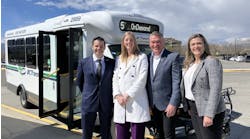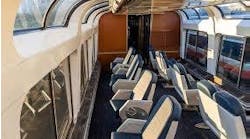The Los Angeles County Metropolitan Transportation Authority has signed a contract with New Flyer of America for 35 sixty-foot zero emission articulated buses and 65 sixty-foot compressed natural gas (CNG) buses. The buses support Metro’s commitment to sustainable transportation, which is working toward a 100 percent zero emission fleet by 2030. Metro is the largest American transportation agency to endorse such a goal.
“Metro is fully committed to improving the health of people across the region – and these new electric buses will help improve air quality and reduce noise pollution,” said Los Angeles Mayor Eric Garcetti, chair of the Metro Board. “As the largest transit agency in the country to commit to a fully electric fleet by 2030, Metro continues to serve as a global leader for sustainable policies, all while creating good-paying local jobs.”
The New Flyer 60-foot zero emission articulated buses will be assigned to the Metro Orange Line. Both the electric and the CNG buses will replace retirement-eligible compressed natural gas (CNG) vehicles currently in operation.
“We are thrilled to build our low and no emissions footprint in America with an exceptionally progressive partner such as Metro,” said Wayne Joseph, president of New Flyer of America. “Together, we are building a sustainable transit infrastructure, preserving the environment and supporting the development and maintenance of local jobs. We are proud to be the largest employer of American workers of any transit bus manufacturer in North America.”
Metro directly operates a fleet of 100 percent CNG buses but in 2016, the Metro Board directed Metro staff to create and implement a plan that would move the agency to electric buses on the Metro Orange Line by 2020, with the Silver Line to follow.
“As we move into the future, Metro is exploring how technology can help us keep improving our service,” said Metro CEO Phillip A. Washington. “We believe our purchase of low and zero emission buses will be good for the agency, as well as the people of our region. And we hope to inspire other transit agencies to consider this as a possibility and investigate how they can transition toward greener fleets for the benefit of patrons, as well as the cities and towns they serve.”



